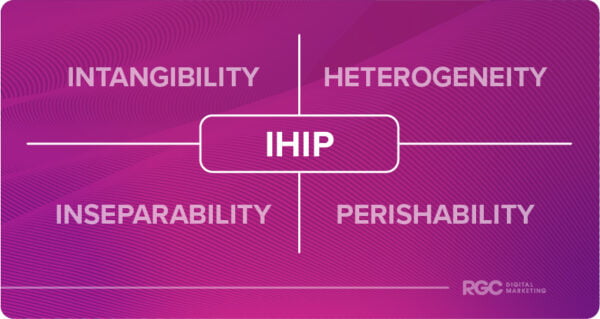Revolutionise Your Service Marketing: Powerful Strategies for Success

Table of Contents
- Understanding Service Marketing
- Essential Components of Service Marketing Strategies
- Market research
- Positioning and differentiation
- Building an online presence
- Content marketing
- Innovative Service Marketing Techniques
- Personalisation For Service Marketing
- Influencer marketing
- Video Marketing
- Chatbots and AI
- Measuring the Success of Service Marketing Strategies
- Key Performance Indicators (KPIs)
- Monitoring and Analysing Data
- Powerful Strategies For Success
In today’s digital age, businesses need to have a strong online presence to succeed. With so many options available to consumers, it’s crucial to stand out from the competition and connect with potential customers in a meaningful way. This is especially important for service-based businesses, where building trust and credibility is essential. So, how do you create a marketing strategy that effectively promotes your services and resonates with your target audience? The answer lies in service marketing strategies – a set of techniques designed to help service-based businesses reach and engage their ideal customers.
The goal of this article is to guide businesses through the process of developing and implementing effective service marketing strategies. Whether you’re just starting out or looking to improve your existing marketing efforts, we’ll provide you with the tools and insights you need to succeed.
By the end of this article, you’ll have a better understanding of the importance of service marketing strategies, how to identify your target audience, how to craft compelling messaging, how to choose the right marketing channels, and how to measure your success.
So, are you ready to take your service marketing to the next level? Let’s dive in and start exploring how to identify your target audience.
Understanding Service Marketing
Service marketing refers to the promotion of intangible products, such as expertise, advice, or experiences, rather than physical goods. Unlike traditional marketing, which focuses on tangible products, service marketing places a greater emphasis on the customer experience and the interaction between the customer and the service provider.
The key elements of service marketing include:
- Service offering: the intangible product or service that is being promoted
- Service quality: the level of excellence or satisfaction that customers receive from the service
- Service delivery: the process by which the service is delivered to the customer
- Service environment: the physical or virtual setting in which the service is delivered
Service marketing presents unique challenges due to the nature of the product and the variability of the customer experience. These challenges are captured in the four key characteristics of services, known as the IHIP model:
- Intangibility: Services cannot be seen, touched, or felt before they are purchased, making it difficult for customers to evaluate their quality.
- Heterogeneity: Services are highly variable and can be impacted by a range of factors, including the service provider, the customer, and the service environment.
- Inseparability: Services are often produced and consumed simultaneously, meaning that the customer and the service provider are closely involved in the delivery process.
- Perishability: Services cannot be stored or inventoried, meaning that they must be produced and consumed in real time.

Given these challenges, building strong customer relationships is essential for success in service marketing. By providing excellent customer service and establishing a strong reputation for quality and reliability, service providers can create loyal customers who are more likely to return and refer others. In service marketing, success is often built on long-term relationships and partnerships with customers. By focusing on delivering exceptional experiences and building trust and rapport with customers, service providers can create a foundation for long-term growth and success.
Essential Components of Service Marketing Strategies
-
Market research
Market research is a critical component of any service marketing strategy. By understanding the needs and preferences of their target audience, service providers can develop more effective marketing campaigns and deliver more relevant services. Key components of market research include:
- Identifying target audience: Service providers should research their target audience to understand who they are, what they need, and how they make purchasing decisions.
- Understanding customer needs and preferences: Through market research, service providers can gain insight into the specific needs and preferences of their target audience, allowing them to tailor their services and marketing efforts accordingly.

-
Positioning and differentiation
Positioning and differentiation are essential for standing out in a crowded marketplace and establishing a unique value proposition. Key components of positioning and differentiation include:
- Establishing a unique value proposition: Service providers should focus on what sets them apart from their competitors and emphasise these unique features in their marketing efforts.
- Creating a competitive advantage: By offering services or features that their competitors do not, service providers can create a competitive advantage and attract more customers.
-
Building an online presence
In today’s digital age, building an online presence is crucial for service providers. A well-designed website and active social media presence can help service providers connect with customers and showcase their services. Key components of building an online presence include:
- Importance of a well-designed website: A website is often the first point of contact between a service provider and a potential customer. A well-designed website can help service providers establish credibility and showcase their services effectively.
- Utilising social media platforms: Social media platforms provide a way for service providers to connect with customers and build relationships. By sharing informative and engaging content, service providers can establish themselves as experts in their field.
-
Content marketing
Content marketing involves creating informative and engaging content that is designed to attract and retain customers. Key components of content marketing include:
- Creating informative and engaging content: Service providers should create content that is relevant to their target audience and provides value.
- Importance of storytelling and showcasing expertise: By sharing stories and examples that showcase their expertise, service providers can establish themselves as thought leaders in their field and build trust with their customers.
By creating and sharing high-quality content that resonates with their target audience, service providers can build their reputation, attract more customers, and ultimately grow their business.
Innovative Service Marketing Techniques
-
Personalisation For Service Marketing
Personalisation is a highly effective technique for connecting with customers and building stronger relationships. By tailoring marketing messages to individual customers and utilising their data for targeted marketing, service providers can improve engagement and loyalty. Key components of personalisation include:
- Tailoring marketing messages to individual customers: Service providers can use customer data such as purchase history, browsing behaviour, and demographics to create personalised marketing messages that resonate with each customer.
- Utilising customer data for targeted marketing: By analysing customer data, service providers can identify patterns and trends to inform targeted marketing campaigns and improve overall customer experience.
-
Influencer marketing
Influencer marketing is a strategy that leverages industry influencers to reach a larger audience and establish credibility and trust. Key components of influencer marketing include:
- Leveraging industry influencers to reach a larger audience: Service providers can partner with industry influencers to promote their services and reach a wider audience.
- Establishing credibility and trust: By partnering with influencers who are trusted and respected in their field, service providers can build credibility and trust with their target audience.
-
Video Marketing
Video marketing is an increasingly popular technique for engaging customers and showcasing services. Key components of video marketing include:
- Benefits of using video content in marketing efforts: Video content can be highly engaging and effective at conveying complex information. It can also improve search engine optimisation (SEO) and increase website traffic.
- Engaging customers through tutorials, testimonials, and live streaming: Service providers can use video content to provide tutorials, showcase customer testimonials, and even host live-streaming events to engage with their target audience.
-
Chatbots and AI
Chatbots and artificial intelligence (AI) are powerful tools for improving customer service and gaining insights into customer behaviour and preferences. Key components of chatbots and AI include:
- Improving customer service through automation: Chatbots and AI can handle routine customer service inquiries and enhance response times, freeing up human resources for more complex inquiries.
- Gaining insights into customer behaviour and preferences: By analysing customer interactions with chatbots and AI, service providers can gain valuable insights into customer behaviour and preferences, which can inform marketing and service delivery strategies.
As the business landscape continues to evolve, service providers must stay up-to-date with the latest marketing techniques to remain competitive. By incorporating innovative strategies such as personalisation, influencer marketing, video marketing, chatbots and AI, service providers can improve engagement, build stronger relationships, and ultimately drive growth.
Measuring the Success of Service Marketing Strategies
Effective service marketing strategies are not only about creating and implementing them but also about measuring their success. Without proper evaluation, businesses may not know if their efforts are producing the desired results. Therefore, it is essential to monitor and measure the effectiveness of your service marketing strategies to ensure that they are achieving their objectives.
-
Key Performance Indicators (KPIs)
Key Performance Indicators (KPIs) are quantifiable measures that help businesses evaluate their performance and progress towards achieving their goals. Some of the most important KPIs for service marketing strategies include:
- Return on Investment (ROI): This metric measures the financial return that a business gets on its marketing investments. It is calculated by dividing the revenue generated from the marketing campaign by the cost of the campaign. A positive ROI indicates that the marketing strategy was successful in generating revenue.
- Customer Acquisition Cost (CAC): This metric measures the cost of acquiring new customers through marketing efforts. It is calculated by dividing the total marketing costs by the number of new customers acquired. A lower CAC indicates that the marketing strategy was effective in attracting new customers at a lower cost.
- Customer Lifetime Value (CLV): This metric measures the total revenue that a business can expect to generate from a customer over their entire lifetime. It is an important metric as it helps businesses to understand the long-term value of their customers and the effectiveness of their marketing strategies in retaining them.

-
Monitoring and Analysing Data
In order to evaluate the success of your service marketing strategies, it is important to monitor and analyse relevant data. By tracking the performance of your marketing campaigns, you can identify areas that need improvement and adapt your strategies to evolving trends. Some ways to monitor and analyse data include:
- Identifying areas of improvement: By analysing customer feedback, web traffic, and other relevant data, businesses can identify areas that need improvement. For example, if a business finds that its website is not generating sufficient leads, they can make changes to improve its functionality and user experience.
- Adapting marketing strategies to evolving trends: By analysing industry trends and customer behaviour, businesses can adapt their marketing strategies to stay relevant and competitive. For example, if a business finds that their customers prefer video content over text-based content, they can shift their content marketing strategy to focus more on videos.
Measuring the success of service marketing strategies is critical to the growth and sustainability of a business. By using KPIs and monitoring and analysing data, businesses can evaluate the effectiveness of their marketing efforts and make informed decisions to improve their strategies.
Powerful Strategies For Success
In today’s competitive landscape, service marketing strategies are crucial for businesses to thrive. By effectively implementing market research, positioning and differentiation, building an online presence, content marketing, personalisation, influencer marketing, video marketing, chatbots, and AI, companies can successfully reach and engage their target audience.
Furthermore, it’s essential to measure the success of these strategies through key performance indicators such as return on investment, customer acquisition cost, and customer lifetime value, and monitor and analyse data to identify areas of improvement and adapt to evolving trends.
Businesses must stay up-to-date with the latest service marketing strategies to remain competitive in the digital era. By implementing the discussed strategies and techniques, companies can effectively engage their target audience, build strong customer relationships, and ultimately achieve success. So, don’t hesitate to explore these strategies and apply them to your business for optimal success. Remember, in the words of marketing guru Seth Godin, “Marketing is no longer about the stuff that you make but about the stories, you tell”.


